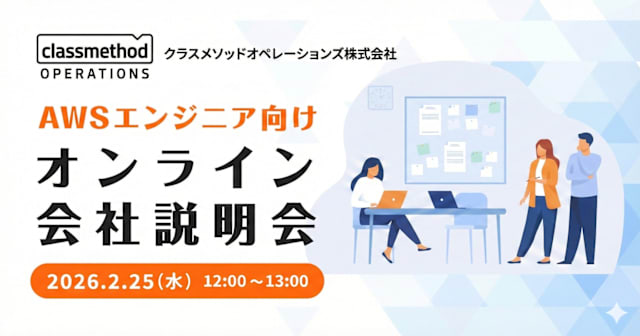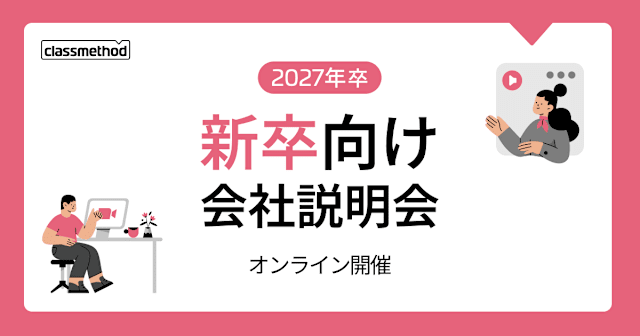
What to prepare before coming to Japan — From a foreign engineer’s perspective
この記事は公開されてから1年以上経過しています。情報が古い可能性がありますので、ご注意ください。
みなさま、ご機嫌いかがでしょうか。コンサルティング部のキムです。
弊社ではグローバルな事業展開のため、世界の優秀なグローバル人材を積極的に採用しております。
なので、私が外国人としてクラメソへ入社してこの4ヶ月間感じたことの中で、入社前に分かっていたら良かったと思ったことを、これから外国から日本の会社へ入社する方に共有したく、本記事を書きました。
なので、本記事の読者は外国人の方で、英語でブログを書くようになりました。
If you're reading this article, perhaps you've been either decided or preparing to join a Japanese company, which is awesome!! :D
I guess you really enjoy challenging and pushing yourself to the limit of your ability. A life in Japan is full of joys and I can safely say that I can't be satisfied more.
Intro
Before getting into the topic, I'd like to introduce myself and the company I belong to shortly, in order to make you better understand the content of this post.
I've been working as an "AWS Engineer" in Classmethod, Inc. for about 4 month at the moment of writing this post. Classmethod Inc. is best-known as one of the top cloud consulting partners, which is specialized in AWS(Amazon Web Services). It's also been awarded "APN Consulting Partner of the Year 2018 – Japan" last year. Yes, we've officially aced the Japanese market out of all the AWS consulting partners!
Enough for the company (not really lol) and next, who am I?
I'm from South Korea and have (roughly) about 1-2 years of professional software development experience. I'm still learning Japanese and never feel enough when it comes to Japanese skills. My Japanese skills are currently in the level of communicating in Japanese quite comfortably in casual context, and having a little hard time in the context of business and technical discussions. Before joining Classmethod, I had hardly read Japanese blogs, meaning that I didn't even get prepared to work in Japan in terms of language skills. I'm in charge of not only communicating with the team members but also with the customers, who are mostly major companies in Japan, as a sort of consultant. Meaning that professional Japanese skills are strongly required.
If you didn't get the point yet, I'd like to share the lessons I learned while working in Japan for 4 months, focusing on how important it is to have Japanese skills to work in Japan. All the contents of this post are based on my personal experience as an IT engineer, but I think you still can get the point and get your lessons even though you're not an engineer or IT-related.
Also, I'll mention some company-specific stuffs and tips, since I was motivated to write this article at first for those who's been determined to enter Classmethod :)
Yes!! we're looking forward to working with you!!!
Premise
If one of the followings are relevant to your case, please carefully read this article and get you prepared better :)
- The company you're entering doesn't have enough experience working with foreign workers.
- Your Japanese skills are not advanced level (You're not confident in communicating in Japanese / you're not aware of Japanese-style business manner)
- You're serious in that you want to build your career in Japan.
Classic, the language barrier
Working in a foreign country isn't a picnic, is it? And it's much more challenging in case that you have to communicate with your colleagues in a foreign language that you're still learning. You might be thinking you can communicate with them in English, and that's the point I'd like to tell you.
YOU CAN'T.
It's not because your English skills are bad, but because you don't want to be isolated. Japanese are shy, and they tend to be somewhat afraid of speaking something in English. They are so nice and kind, but they can't help themselves feeling awkward at least a bit when you're trying to talk to them in English. They will put their best effort to communicate with you, but both of you will have to be very patient. Even though you and your team members are nice to each other, you'll likely be feeling lonely, if not isolated. This might not be the best option for both of you, especially if you're serious of being a part of the company and Japanese culture. And even worse, you might start to lose confidence due to the fact that you're not able to be responsible for your works without being helped by others. Even though the language barrier is a matter of course and expected from the beginning, loneliness and the feeling of losing confidence would be even worse than you think.
Let me take an example of mine. The way how Classmethod works is highly text-based. We use Confluence, where we save a massive amount of information about the past projects. We share all the ideas and progress of works via Confluence. And I had to read (lots of) Japanese documents to catch up stuffs. I'm actually in charge of gradually translating the Japanese documents into English, but at the point when I joined, no single English document existed. Also, we exploit Slack as a communication tool. Even though you're sitting just right around the team members you're talking to, it's likely that you're talking to them on Slack. This might seem to be weird. But when you consider a good portion of team members work remotely, text-based communication can't be more natural in such an environment.
Do you see what was challenging for me? Well, if you're comfortable with the language, nothing matters, of course. But in the opposite case when you're not comfortable with the language, it would cause some serious communication problems. You need to catch up everything relying only on your imperfect Japanese skills.
Of course the company has been supporting to their best to help me learn Japanese and make me being confident as a professional, (yes they actually do!!) but you and I are also in charge of having extraordinary will to overcome the language barrier.
And the good news is, most of those working for Classmethod are pushing themselves so hard to learn English from this year. The growth they've made is meaningful and they're getting better and better to communicate in English. I guess (and hope) some part of the language barrier that I wrote in this section would be no longer valid at the point you enter :)
The company really cares your career
Though the language barrier is painful, on the other hand, Japanese company would be the best option when it comes to build your career. Japanese companies tend to focus on stabilizing their businesses and organizations, and one strategy to achieve it is done by investing in their employees' career development. They invest a lot of time and money in educating their employees and helping them even strengthen their skills further. This happens in the form of employment as well. Hiring decisions are made not only based on the candidate's current skills but also with the potentials the candidates hold. I'm pretty sure that the potential part is more significant than their current skills as looking back to the interview process of mine - Other than Classmethod, I had been also offered by Softbank, NHN, and IIJ to name a few. I felt a strong impression of that they really evaluated my value with my potential, not with my current skills at the point.
What this actually means? Japanese companies are actually eager to grow their business along with your growth. Once you get over the big hurdle - the language barrier - I firmly believe you'll be able to build your career to the best in Japan!
And if you're joining Classmethod, thank God, you're on the right path. We have a lot of top AWS engineers acknowledged by AWS Japan, and they are working on the very next seats of yours. You can ask them and get excellent feedbacks from them, which leads you to grow much much faster.
Well, there's actually a loooooot of benefits working in Classmethod, but it's worth being written and dealt with by another article :)
What's recommended to do before you actually come to Japan
This is the part you were looking for. Right? :D
Okay, let's get started!
1. Read Japanese articles related to your job field
This is recommended if your Japanese are intermediate-level or above. If you're a beginner level, you can safely ignore this advice and focus on building the fundamentals and basics of Japanese language. There should be a lot of learning materials for Japanese beginners.
As I mentioned above, professional Japanese skills are required in the Japanese business world. But it's pretty impossible to be able to upgrade your language skills at the level of professional in such a short term. But I think that a better approach would be to set a goal to master your Japanese skills on a specific field. I mean, your job-specific field.
Taking a concrete example for those who are expected to join Classmethod soon, read AWS blogs in Japanese as much as possible. Developers.IO, which this article belongs to, would be the best option for you. Developers.IO is one of the largest blog sites in Japan and it's reached over 2 million PVs. The recent posts are always up-to-date and produced by super competent engineers of Classmethod. It's kind of Japanese go-to site for those searching for AWS related information. They just search for the information they need IN THIS BLOG. You can learn both Japanese vocabulary and expressions that is tech-related and tech knowledge at the same time by subscribing Developers.IO. It's highly recommended way and please allow me to let you know, you'll refer to this blogs in daily basis at work in Classmethod.
Like this, you can improve both language skills and work related knowledge at the same time by subscribing such articles. Watching dramas and movies and learning from them are also great way to learn languages, but it's usually just useful for casual context. You'd better find learning from job-related contents useful to achieve your professional goal as fast as possible.
2. Be aware of Japanese business manner
Well, I'm still learning how different between the Japanese business manners and what I know in my country. But I'm sure as well that it would hugely differ from what they do in the English-spoken countries. Japanese don't like to say things straight in order to be considerate to others, especially for the business partners. I mean they avoid straightforward conversation. Even if a misleading happened caused by your business partner, you should refrain from pointing it out forthrightly. I'm not even able to imagine how awkward it would be when you point out the mistake your partner made in a straightforward manner. You really need to be conscious of this Japanese manner.
One of interesting manners that I've learned recently is about exchanging name cards. The point I felt interesting was that when you exchange your name card with your client, you're expected to place your hand which holds your name card below your client's. By doing this you express your emotion of acknowledging you're in a somewhat lower position than your client. What this suggests is that there's an implicit hierarchy in the relationship between you and your client, so you need to be conscious of your position in the relationship. This kinds of Japanese common sense might come to you as a big hurdle if you're not aware of or not accustomed to. Therefore, you have to be aware of this to adapt quick at work in Japan.
Compared to other Japanese companies, Classmethod has been famous for its free atmosphere at work. Customer companies of Classmethod are already aware of this and they tend to accept the way we do, which means you get less pressure regarding acting super polite to the customers. But this is really a rare case and only few Japanese companies are like this as far as I know. So you really need to know Japanese style business manner.
3. Better job skills are always the better
What I mean by this is that you'll be a foreigner here, and will be highly likely suffering from communicating with Japanese. The communication issues get even worse at work. But if you have better job skills, chances are, you would better understand what your colleagues are talking about as you have knowledge and backgrounds regarding the work you're in charge of.
Let me take an example of mine where AWS knowledge is valued. At the moment of me joining Classmethod, I was not actually confident on AWS services. I didn't even know how to design VPC, wasn't aware of limitation of each services, and many more. With that poor knowledge and prior experience on AWS, the communication in Japanese was even harder. I had no idea how to ask against what I was curious about, not only because of my poor Japanese skills but also because I didn't understand the colleagues' words at all. If it were said in Korean, which is my mother tongue, I could at least understand what they're talking about and know how to ask against what I was wondering. But it was completely impossible at that time. Now I'm getting better and better to communicate with my team mates not only because my Japanese skills got improved, but also my AWS knowledge and experience got widened and deepened than a few months ago.
So I highly recommend you to better prepare yourself being equipped with job skills and knowledge required in your field before coming to Japan, which will play a key role in communication.
4. Have a mindset of accepting difference
If it's your first time working abroad, I think the key to successfully adapt in the new environment is to have the mindset of accepting difference. This is somewhat related to the advice I wrote right above, I'm saying more general stuffs here. Depending on your background, you might feel uncomfortable with some cultural or behavioral differences. I know this sound so banal that you think it's not even counted, but I would say it's worth being stressed once again before you come to Japan. Whatever you face in Japan, just try to be open-minded and keep being positive and you'll get it over.
Conclusion
I can definitely say that working in Japan is worth experiencing in your life. People are so kind, foods are great, and there are so many attractions around the city. You'll never get bored. You'll fall in love with Onsen(hot springs). I can't list all.
On the other hand, you're required to keep yourself motivated all the time to overcome all the difficulties. No need to mention the language barrier and cultural differences, you need to fight with loneliness as well. You need to keep moving forward because that would be the reason you're coming. Otherwise if you're coming to Japan to enjoy your life and have fun, chances are, you're likely being in trouble facing a lot of unexpected problems.
I hope you find this article useful. And I sincerely hope that your life in Japan will be satisfying and successful. Thanks for reading!! :D






